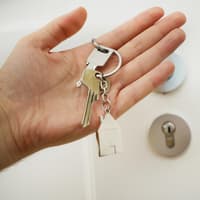
The lighting
Light brings a sense of security into the home, but is also a cost factor. That's why you should choose your light sources carefully. With a service life of 25,000 hours, the LED beats energy-saving lamps (approx. 10,000 hours) and halogen lamps (approx. 3,000 hours) hands down. They also require up to 80 percent less electricity than the "old" light bulb. It is therefore best to use LEDs and energy-saving lamps. The same applies: only switch on the light where you need it. Timers and power strips with switches also help you to turn the lights on and off as required. For the garden, we recommend lamps that draw their energy from solar cells. The light is then even free!
In the kitchen
... there are some power guzzlers lurking in the kitchen, especially the fridge. Energy-saving tip from Stiftung Warentest: It's better to leave the fridge door open when putting things in or taking things out instead of opening it for each yogurt. You should also defrost and clean the appliance regularly to reduce the strain on the cooling struts. If the freezer is leaking, it will use more energy to cool. Check the seal by placing a switched-on flashlight inside. If you can see the light when the door is closed in a dark room, you should replace the rubber. When it comes to dishwashers, the motto is that they should be bigger rather than smaller, as mini appliances use almost as much energy as large ones! And: Always load the appliance fully.
Household appliances
Even if your dishwasher, washing machine, fridge etc. are still working: It may be worth replacing the appliance for reasons of age if it is more than ten years old, for example. Newer appliances have better energy efficiency and use less electricity and water in the long term. If possible, wash your laundry at low temperatures. 30 to 40 degrees is perfectly adequate and more energy-efficient than 60 to 90 degrees. And: it is better to smooth out damp laundry from the dryer and let it dry out instead of drying it again.






